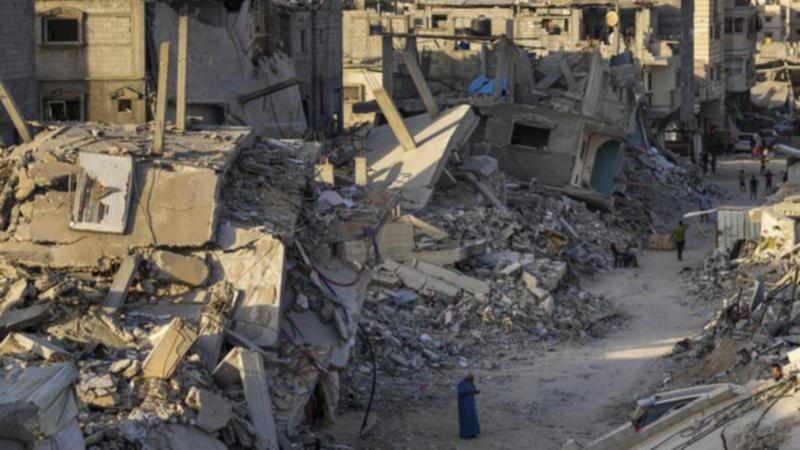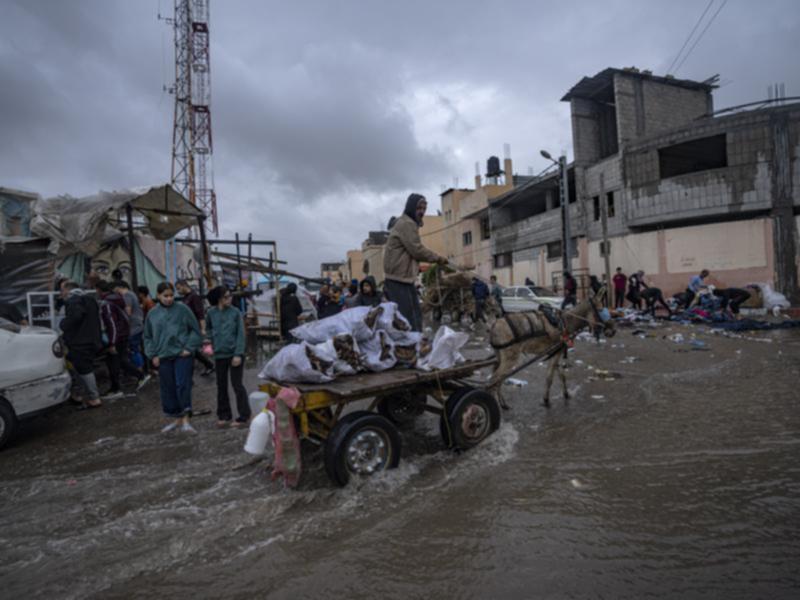THE WASHINGTON POST: Gaza deal appears distant even with Lebanon cease-fire
THE WASHINGTON POST: Analysist say despite signs of momentum, significant gaps remain between Israel and Hamas over key issues, including the shape of any withdrawal of Israeli forces from Gaza.

JERUSALEM - The cease-fire between Israel and Hezbollah reached this week has revived hopes that a peace deal to end the longer, even more destructive war between Israel and Hamas in the Gaza Strip could soon be within grasp.
But analysts said Wednesday that despite signs of momentum, significant gaps remain between Israel and Hamas over key issues, including the shape of any withdrawal of Israeli forces from Gaza and the long-term role, if any, that Hamas will play in the enclave, which it had governed for more than 15 years.
A top Israeli demand is for Hamas to release dozens of hostages who were captured during its assault on Israel on Oct. 7, 2023. Hamas, however, has little incentive to relinquish this trump card unless its demands are met, said Mkhaimar Abusada, a Palestinian political analyst. “The gaps have not narrowed,” he said. “It’s very much the same as before.”
Sign up to The Nightly's newsletters.
Get the first look at the digital newspaper, curated daily stories and breaking headlines delivered to your inbox.
By continuing you agree to our Terms and Privacy Policy.In the coming days, U.S. officials will “make another push with Turkey, Egypt, Qatar, Israel and others to achieve a cease-fire in Gaza,” President Joe Biden announced Tuesday. But previous U.S.-led attempts at reaching a sustained cessation of hostilities in Gaza have fallen short in the past year.
Israeli Prime Minister Benjamin Netanyahu’s governing coalition depends on support from far-right lawmakers who have called for a “total victory” in Gaza and are unlikely to accept a cease-fire with Hamas, analysts say. Israeli forces have emptied much of northern Gaza of Palestinian residents, and several top Israeli officials, including Finance Minister Bezalel Smotrich, have called for Israel to reoccupy Gaza permanently.
Still, others within Israel’s government are seeking to use the Lebanon deal to revive negotiations with Hamas, said a person familiar with the matter who spoke on the condition of anonymity to speak on the ongoing discussions. Officials are considering even a short-term agreement that would free a limited number of hostages with the hopes that this could “get momentum” toward a more ambitious deal, the person said.
As Israeli officials raced toward finalizing the Lebanon agreement, they have sought to rebuild their relationship with Egypt, which could serve as a mediator with Hamas. “The idea is to convey to Hamas, ‘You’re on your own now. There’s no one helping you, so make the deal,’” the person said.
In an official statement Wednesday, Hamas said it would “cooperate with any efforts” to bring an end to the war in Gaza but set conditions, including the withdrawal of Israeli forces, the return of displaced people, and a “real and complete” prisoner exchange deal. Hamas has said it is still interested in playing a political role in Gaza - a condition that Israel and the United States have rejected.
Hezbollah began attacking Israel hours after Hamas’s surprise assault last year. The Israeli military, now freed from fighting on the northern border, could intensify its campaign in Gaza, said Yaakov Amidror, a former Israeli national security adviser, in a briefing with reporters.
“Our ground forces can cope with the issue of Hamas in a much more intensive way than today and for a very, very long time,” he said.
This could exert pressure on Hamas but is unlikely to force a cease-fire, said Abusada, the Palestinian analyst. More likely, this escalation would merely increase the suffering of the 2 million people still left in Gaza, he said. “It could be that we haven’t seen the worst of what the Israelis can do to the Palestinians in Gaza,” he said.

As the Lebanon cease-fire came into effect Wednesday, Israeli forces continued to pound Gaza, carrying out multiple strikes overnight, Gaza residents and the Gaza Health Ministry said.
About 4:30 a.m., airstrikes hit a shelter housing displaced people next to Kamal Adwan Hospital, one of the remaining health facilities in northern Gaza, causing huge fires, said Mohammad Abd al-Rahman, 34, who witnessed the attack from a building nearby. Israeli military vehicles surrounded the shelter and fired continuously toward it for more than two hours, he said.
A strike was also carried out on al-Tabeen school east of Gaza City, where displaced people were sheltering, causing multiple casualties, according to local reports. In a statement, the Israeli miliary said its target was Mumin al-Jabari, a member of Hamas’s sniper unit, who had allegedly stored weapons inside the school.
More than 30 people were killed and dozens more injured in Israeli strikes over the past 24 hours, said Gaza’s Health Ministry, which does not differentiate between civilians and combatants.
Ahmed al-Ras, 40, a Gaza resident in Deir al-Balah, said he was relieved but envious as he saw photos of Lebanese civilians returning to their homes in the country’s south in the wake of the cease-fire. He and his family were forced to leave their homes in Gaza over a year ago, he said, and have been displaced multiple times by Israeli attacks.
“Here in Gaza, I do not care who makes the decision to stop the war. What is important is that it ends as soon as possible,” he said.
- - -
Rubin reported from Tel Aviv and Harb from London. Hazem Balousha in Toronto contributed to this report.
© 2024 , The Washington Post
